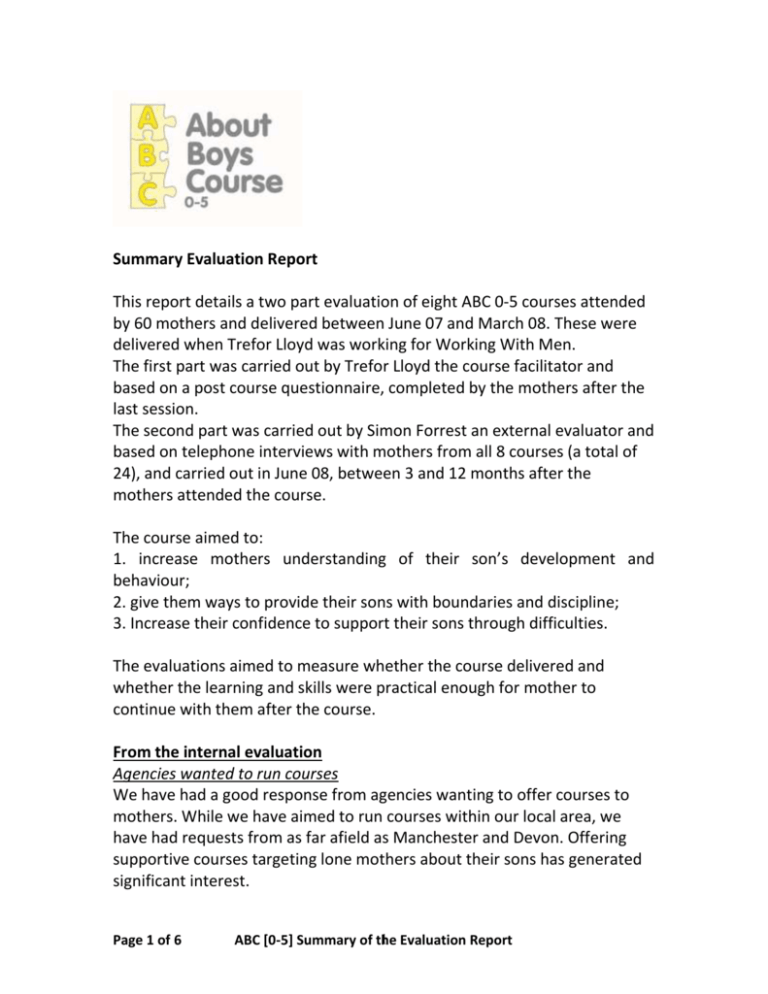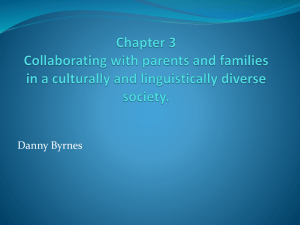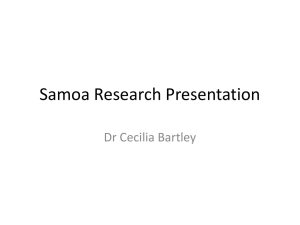Raising Boys 0-5 - Boys Development Project
advertisement

Summary Evaluation Report This report details a two part evaluation of eight ABC 0-5 courses attended by 60 mothers and delivered between June 07 and March 08. These were delivered when Trefor Lloyd was working for Working With Men. The first part was carried out by Trefor Lloyd the course facilitator and based on a post course questionnaire, completed by the mothers after the last session. The second part was carried out by Simon Forrest an external evaluator and based on telephone interviews with mothers from all 8 courses (a total of 24), and carried out in June 08, between 3 and 12 months after the mothers attended the course. The course aimed to: 1. increase mothers understanding of their son’s development and behaviour; 2. give them ways to provide their sons with boundaries and discipline; 3. Increase their confidence to support their sons through difficulties. The evaluations aimed to measure whether the course delivered and whether the learning and skills were practical enough for mother to continue with them after the course. From the internal evaluation Agencies wanted to run courses We have had a good response from agencies wanting to offer courses to mothers. While we have aimed to run courses within our local area, we have had requests from as far afield as Manchester and Devon. Offering supportive courses targeting lone mothers about their sons has generated significant interest. Page 1 of 6 1 Evaluation Report ABC [0-5] Summary of the Content has developed rather than changed significantly Courses have remained much the same through this delivery period. Boundaries and discipline are the critical areas for mothers and are usually the elements that attract them to the course initially. For some (usually with very young boys), it is their anxiety about the future that also attracts them. Strategies they can try at home have been particularly well received and many have tried them with enthusiasm, returning to report on their success, and sometimes failure. Nothing is guaranteed, mothers are offered a range of strategies and encouraged to practice them. Motivation and communication have become important themes as has preparation for school (dealt with in the last session). These sessions have helped mother reflect on the future and encourage them to understand their boys and be pro-active in his development, rather than reactive in his behaviour. Narrow age band One of the initial pilot courses contained mothers with sons from 3 months to 16 and while this stimulated a lot of discussion, it was much harder to keep a focus on specific age related issues. Defining 0-5’s has helped raise and address age-specific issues and mothers have gained from this as well as the course being much more focussed and useful. Where the age of the sons was even narrower (Wormholt for example, all but one of the mothers had sons aged 4), the conversations involved most of the mothers. Size of groups Core groups have ranged from 5 to 10 and have varied enormously. Those with 6 or less mothers have become much more chatty and anecdotal while the larger the group, the more course themes are kept to. This is not to say the larger groups; mothers were more cautious about what they said, but they made points rather than told stories. In the smaller groups stories were more problematic when one or two of the mothers were more dominant or in need of specific help. Page 2 of 6 2 Evaluation Report ABC [0-5] Summary of the Women were very honest with me and each other Courses so far have been particularly effective in targeting and engaging mothers and increasing their understanding, and confidence of their sons. Part of this effectiveness has been as a result of engaging mothers in understanding their sons and not about their parenting of them. Our focus on their sons allows them to look at their parenting from a different perspective. This has meant that courses have been seen as worth attending and not carrying a stigma (in the way that some parenting programmes have). This seems to have allowed mothers to be very honest about how they deal with their boys (slapping and hitting have been talked about often within 10 minutes of the first session). Child protection issues have of course been at the forefront of the courses delivered so far. Are boys the problem? Many of the mothers arrive with stories of their sons as a terrier, manipulative and generally projecting them as the problem. As we look at more general gender issues and discipline and boundaries, mothers begin to understand that their 2 year old does not have the capacity to ‘manipulate’ and that can bring a change in their reactions to their sons, which in turn can and often do change their sons behaviour significantly. Practical was critical My legitimacy (as the course facilitator) has been as a result of my ability to give the mothers strategies and techniques to try with their sons that more often than not worked. This legitimacy leads to their willingness to highlight developmental issues, and many of the mothers taking the opportunity to grapple with sometimes complex issues. They valued the understanding of boys, techniques and strategies with many happy to try these out as homework. What mother valued most Trawling the comments suggests that discipline and boundaries strategies were critical to the success of the courses, which led to a rise in their confidence to both deal with their boys and understand their development, with virtually all mothers reporting an increased understanding and confidence in dealing with their sons. Page 3 of 6 3 Evaluation Report ABC [0-5] Summary of the Only lone mothers? While the courses have been advertised for lone mothers, mothers have often been sole carers with husbands / partners more distant, but around. This has not caused any noticeable problems or benefits. From the external evaluation Summary and discussion This report describes the findings of follow-up interviews with 24 mothers who had participated in ‘Raising Boy’s ‘[1] courses between June 2007 and March 2008. The purpose of this section of the report is to summarise the main findings and explore, in discussion, some of their implications. Overall, this evaluation reinforces the findings of the summative evaluation undertaken with mother at the immediate end of each course. In short, mothers found the courses informative, enjoyable and useful and there are strong indications that they both put into practice the knowledge and skills that they acquired and have found them to be productive in terms of improving their control over their relationships with sons, the quality of those relationships and the management, and in many cases the reduction instances of conflict between them. The principle outcomes to which the finding point relate to mothers’ confidence and capacity to parent their sons. In summary, whether it be by employing the most frequently referred to techniques of reinforcing their communication with their sons by ‘touch and tell’ methods or the imposition of rules and boundaries in relation to a verity of specific behavior (bedtime, bathtime, mealtimes and so on), these mothers accounts suggest that they achieved an enhanced level of control over their relationships with their sons and through this, over their son’s sometimes disruptive and challenging behavior. The course achieved this level of impact because it coupled relevant and appropriately pitched information about gender and masculinities along with relatively easy to employ practical skills. Mothers seem to have appreciated this linking of theory and practice which enabled them to make sense of their actions and those of their sons and feel more competent and Page 4 of 6 4 Evaluation Report ABC [0-5] Summary of the in control. As this evaluation shows, the immediate effectiveness of these strategies was, for many mothers, also a boon both providing them with a further incentive to continue to employ them and also acquire more skills. The thing that mother have continued to value the most about the course was it capacity to enable them to manage conflict with their sons, resolve disagreement and either avoid or minimise the aggravation caused by a variety of ‘flash-points’ in their everyday life. Although practical methods of controlling their sons’ behavior figured most prominently in interviewees’ accounts of the impact of the course on them, there was evidence, albeit to a lesser extent, that it may also have helped some mothers to support their sons through structural transitions – especially the passage to nursery school. The relative rarity of references to this transition among interviews many reflect the ages of the boys involved and suggests that further follow-up may by warranted to assess if and how the information and techniques which mothers are using now in raising their sons help them when they reach this point in time. The course also seems to have tapped into a rich seam of concerns – which it also addresses. Some mothers contributing to this evaluation identified concerns about boys – perhaps reflecting some socially normative views about the masculinities in and as trouble – also about their competency as lone parents around which they received reassurance to act. There were a few cases where interviews yielded accounts of less impact on the relationships between mothers and sons. Not only were these few in number but also the mothers involved accounted for this in terms of their inability to implement the parenting techniques and information that they had acquired due to the interference of other circumstances and concerns. In one or two cases they were suggestions that the age of sons mattered. This was generally the case where mothers found themselves participating in groups where others mothers had sons of similar ages and their own was either markedly younger or older. However, it may also be, given the findings reported here, that the course has special relevance for mothers of boys of two years or older rather than infants. Page 5 of 6 5 Evaluation Report ABC [0-5] Summary of the Given that only around half of the mothers who have participated in ‘Raising Boys’ courses contributed to this evaluation there is a need to consider if the views of this sample are representative of the group as a whole. I think there is a robust argument that this is indeed the case: the processes by which interviewees were selected drew on all the courses which have been delivered, and, effectively yielded a random sample. Although the possibility that the views of the mothers who did not contribute to this evaluation might diverge from those reported here cannot be discounted, it is against the balance of probability. Although this evaluation did not set out to assess in any systematic way whether the impact of the courses varied according to the time that had elapsed since mothers had participated in them it was a striking finding that this did not seem to be the case. Although mothers’ recall of the course did seem to display a tendency to be more immediate when it had taken place more recently there was no evidence that mothers were making less use of the information or skills that they had acquired from the course according to the time elapsed since its end. The final issue which emerges through these findings and warrants some consideration is the role of the facilitator. Mothers drew attention not only to the content on the course as having a bearing on its utility to them but also the characteristics of the facilitator – specifically his sex, age and the fact that he was a parent. The issue of the extent to which effects of interventions are dependent on the characteristics of a specific facilitator remains a thorny issue in evaluation. What is less debatable than whether anyone can delivery an intervention effectively is that whosoever delivers it will cause it to be mediated in specific ways according to their personal characteristics. This evaluation reminds us that this always needs to be consideration. [1] This summary of findings refers to Raising Boys, which was the courses name at the time of the evaluation. Since that time it has been known as the Boys Development Programme and since Trefor Lloyd has left Working With Men it has been further developed and is now known as the About Boys Course (ABC 0-5). Page 6 of 6 6 Evaluation Report ABC [0-5] Summary of the






